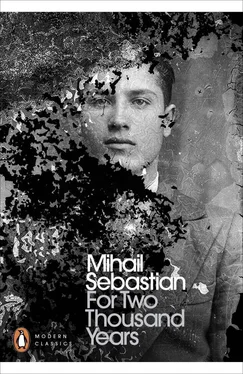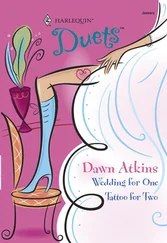Pârlea represents the opposing side. For a long time I could see and understand nothing of it, owing to the endless coils of barbed wire strewn between us. It’s so comfortable and consoling to regard your adversaries as bad and stupid, to the point that, in my lamentable desperation back then, it was the sole crutch available, the last remaining bit of pride. That was a long time ago. More than the relatively few years that have passed. The clouded waters have cleared where the trouble was superficial and become yet more stirred up where the trouble ran deep. People have made their choices, opinions have hardened, foolishness has found the company of foolishness, truths have become more marked. Everything is more ordered. Perhaps the time has come to write the history of the anti-Semitic movement. By which I mean ‘the human comedy’ of people and what they thought rather than the dry facts of actual history, which I am familiar with and which have nothing new to tell. I’m convinced that once I excluded the imbeciles, the professional troublemakers, the agitators, the scattering of layabouts and dimwits, and after identifying in turn brutality, stupidity and scheming, there would still be something that would be a real drama. And that’s when Ştefan D. Pârlea would appear.
Ghiţă Blidaru’s course has become something of an ‘official matter’. Last Saturday a deputy from the biggest party asked the government at question time if it was going to tolerate the university becoming a centre of political unrest.
‘The authority of the state must not be disturbed, Minister, from behind the mask of general theories.’ (The evening papers reproduced this phrase as a headline.)
In fact, nothing serious happened. There were just some lectures about the liberal economic legislation of 1924. Very calm lectures in style, very violent in their stances and conclusions. Starting with the mining law of Vintilă Brătianu, Blidaru has analysed Romanian liberalism. The party is alarmed, the government bored. Vintilă Brătianu must have made a fuss at the last council. ‘He must desist, gentlemen. He must desist.’
Blidaru did not desist at all. For next week he has announced an inquiry into the stabilization plan and credit mechanism that’s being prepared. What’s peculiar about this whole struggle is that while the newspapers are censored and all opposition excluded, an economics professor can openly attack anything he wants and there’s no way to stop him.
Professor Ghiţă’s situation is excellent. He teaches his course, follows his schedule, and nothing else. However, his lectures have become the last refuge for anti-liberalism. The whole public crowds in. Blidaru, unaffected, converses with his students. He has been discreetly offered several foreign posts: the presidency of an economic delegation in Paris or, should he wish, a small delegation in a neighbouring state. He’s refused them all. ‘We’ll see, later, in the summer break. For now, I have my lectures to finish.’
I have trouble understanding his passion for politics. He has no personal ambition to satisfy, no fights to win. He’s certainly no warrior. He is an idler of genius. Rather than marching forward to meet life, he sits still and lets it come to him.
If I’ve learned anything from Ghiţă Blidaru, it is exactly this lack of aggression in dealing with life. His laziness is that of a plant, of a tree. Life grows and decays, storms come and go, death waits somewhere, in the shadows — all harmonious. I believe nothing will ever surprise Blidaru or shake his composure. Not because he is sure of himself, but because he is sure of the earth he walks upon and the sky he finds himself beneath.
‘Worries? Where do you find worries in this world full of certainties? Shouldn’t the simple fact that the sun rises and sets be enough to reassure us?’
If he had been a carpenter, a stonemason, a boatman on the Danube, a ploughman in Vâlcea, his thinking would be no different to what it is today. He is the only man I know whom I feel that fate can do nothing to harm, because he accepts fate, submitting happily to whatever it brings.
With his formidable laziness, his deliberate lack of initiative (‘I have nothing to do with life, life has everything to do with me’), Blidaru is ready to waste every big opportunity, to miss every decisive rendezvous which good or bad fortune arranges. He will always find a book to open in the final hour, a woman to love. For him, nothing is urgent. He has told me so countless times. Every joy has its season, and every pain. Let’s await the passing of the seasons. It’s useless to hurry, because you can’t arrive too soon for winter, which comes to meet you. There is an autumn for every hope, a springtime for each despair. In this race you can never come too early or late: you always come on time, whether you wish to or not.
*
I don’t know how many persistent pains, hidden deaths or unanswered questions Ghiţă Blidaru faces with equanimity. But I can guess. He has made countless renunciations in the fields of intelligence, pride, victory and excitement. Each one of us is barricaded within himself, and most of us seek to strengthen our barricades, to make our inner defences impermeable, while he cooperates with life to knock them down, surrendering before the fight, already beaten. Beaten? No. At most, he has conquered his own self.
I’ve been to Uioara to see how things are going. Rice bores us time and again about every accident with a heater, a lift or lighting. The master wanted a first-hand report.
I’d have liked to have stayed in the cabin where it’s not cold at all once a good fire gets going. But the Duntons wouldn’t hear of it. Marjorie was waiting for me at the station with Eva Nicholson.
‘I’m glad you came,’ she said. Then, in the sleigh, she was quiet the whole time. Eva was asking me about everything and though I answered in a lively enough fashion, I had the impression that Marjorie was paying no attention. She was extraordinarily serious, in her blue ski-suit that gives her that impossibly adolescent air. At the corner of Ursu, she asked the sleigh-driver to stop, and nodded her head to indicate the snow-laden oil wells in the distance.
‘Look how desolate it is.’
To me, the landscape looked peaceful rather than desolate.
In the afternoon I worked at the refinery and took a walk to the oil wells, to see what could be done to put old Ralph’s mind at rest. His alarm was unnecessary. The inevitable trivialities.
In the evening, I spent a long time talking with Marjorie.
Her serious smile, her temples illuminated with blonde hair, her lively young hands were the same as ever, but she was listening as if someone had told her to behave herself. What I still like most about this girl is how she moves, her bearing, the way she leans against a wall, the rather lazy way she sits in an armchair, the sudden way she rises as if frightened. There’s an odd mix of awkwardness and sureness in all her movements, in the way she speaks, in her attention as she listens to you, in her loyal laughter.
She talked about the books she’s been reading, played several pieces for me on the piano, gave me a short theoretical lesson on skiing and put me in the role of judge between her and Phillip, to decide who can get down from Uioara to the Ursu Corner fastest.
‘Tomorrow morning we’ll have a race,’ I proposed.
‘No, tomorrow morning we have other plans for you. It’s a surprise.’
The surprise was a walk to the cabin. I found it all tidy and clean, as if I’d never left. On the brick chimney, two framed pictures: Marin Dronţu and myself. Between them, a small photograph in which I could just make out Marjorie from last summer, in sandals and a tennis dress.
Читать дальше












